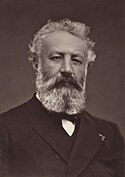Jules Verne Quote
Unhappily for his master, as well as himself, his curiosity drew him unconsciously farther off than he intended to go. At last, having seen the Parsee carnival wind away in the distance, he was turning his steps towards the station, when he happened to espy the splendid pagoda on Malabar Hill, and was seized with an irresistible desire to see its interior. He was quite ignorant that it is forbidden to Christians to enter certain Indian temples, and that even the faithful must not go in without first leaving their shoes outside
Jules Verne
Unhappily for his master, as well as himself, his curiosity drew him unconsciously farther off than he intended to go. At last, having seen the Parsee carnival wind away in the distance, he was turning his steps towards the station, when he happened to espy the splendid pagoda on Malabar Hill, and was seized with an irresistible desire to see its interior. He was quite ignorant that it is forbidden to Christians to enter certain Indian temples, and that even the faithful must not go in without first leaving their shoes outside
Related Quotes
It was uncontrollable, overpowered by others, these colors within me, staring out at a black and white world; without spurning about, wanting to rule, too much negligence, they left me no choice, but...
Anthony Liccione
Tags:
black and white, bring to life, broken, color, colorless, dye, life, lightning, negligence, overpower
About Jules Verne
Jules Gabriel Verne (; French: [ʒyl ɡabʁijɛl vɛʁn]; 8 February 1828 – 24 March 1905) was a French novelist, poet, and playwright. His collaboration with the publisher Pierre-Jules Hetzel led to the creation of the Voyages extraordinaires, a series of bestselling adventure novels including Journey to the Center of the Earth (1864), Twenty Thousand Leagues Under the Seas (1870), and Around the World in Eighty Days (1872). His novels, always well documented, are generally set in the second half of the 19th century, taking into account the technological advances of the time.
In addition to his novels, he wrote numerous plays, short stories, autobiographical accounts, poetry, songs, and scientific, artistic, and literary studies. His work has been adapted for film and television since the beginning of cinema, as well as for comic books, theater, opera, music and video games.
Verne is considered to be an important author in France and most of Europe, where he has had a wide influence on the literary avant-garde and on surrealism. His reputation was markedly different in the Anglosphere where he had often been labeled a writer of genre fiction or children's books, largely because of the highly abridged and altered translations in which his novels have often been printed. Since the 1980s, his literary reputation has improved.
Jules Verne has been the second most-translated author in the world since 1979, ranking below Agatha Christie and above William Shakespeare. He has sometimes been called the "father of science fiction", a title that has also been given to H. G. Wells and Hugo Gernsback. In the 2010s, he was the most translated French author in the world. In France, 2005 was declared "Jules Verne Year" on the occasion of the centenary of the writer's death.
In addition to his novels, he wrote numerous plays, short stories, autobiographical accounts, poetry, songs, and scientific, artistic, and literary studies. His work has been adapted for film and television since the beginning of cinema, as well as for comic books, theater, opera, music and video games.
Verne is considered to be an important author in France and most of Europe, where he has had a wide influence on the literary avant-garde and on surrealism. His reputation was markedly different in the Anglosphere where he had often been labeled a writer of genre fiction or children's books, largely because of the highly abridged and altered translations in which his novels have often been printed. Since the 1980s, his literary reputation has improved.
Jules Verne has been the second most-translated author in the world since 1979, ranking below Agatha Christie and above William Shakespeare. He has sometimes been called the "father of science fiction", a title that has also been given to H. G. Wells and Hugo Gernsback. In the 2010s, he was the most translated French author in the world. In France, 2005 was declared "Jules Verne Year" on the occasion of the centenary of the writer's death.
